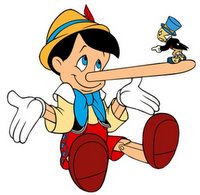OF SIN AND CINPRES
 Of sin and Cinpres
Of sin and CinpresOn Monday Mr Justice Mann gave his long-awaited Patents Court ruling in Cinpres Gas Injection Ltd v Melea Ltd [2006] EWHC 2451 (Ch), available here on BAILII.
Right: a witness being coached to give right right evidence in court
Cinpres sought a declaration that it was entitled to be registered as owner of a patent for gas injection moulding technology used in the plastics industry. The question that had to be resolved was whether the inventor, James Hendry, made the invention when in Cinpres' employment or whether he had discovered it while working for Ladney, an American businessman who had set up Melea as a patent holding company.
Hendry was originally employed by Cinpres but left the company after falling out with it in 1985. A year and a quarter later, after entering into a settlement agreement with Cinpres that contained a confidentiality clause, Hendry took up a consultancy with Ladney with whom he worked till 1991. In 2001 Hendry returned to Cinpres, this time as a consultant.
Meanwhile in 1996 the UK Patent Office had ruled that Hendry had discovered the invention while working for Ladney, in consequence of which Melea was registered as proprietor. Hendry, who had given evidence before the Patent Office in support of Ladney, subsequently wanted to give evidence that he had discovered the invention while working for Cinpres. Cinpres maintained that it was not barred by the earlier proceedings from seeking a fresh declaration that it was entitled to the patent, since Hendry was willing to admit that he had perjured himself when giving evidence in the earlier proceedings and to testify that Ladney had procured, or taken advantage of, his decision to do so.
Dismissing Cinpres' application, Mann J gave judgment for Melea. In his opinion
* The evidence showed that Hendry had lied on oath in the course of the earlier proceedings and that he had indeed both acquired and deployed knowledge of the invention while working for Cinpres.The IPKat notes the closing words of the judge:
* The use of the invention was something that Hendry should have kept confidential under the terms of the settlement agreement with Cinpres; his perjured evidence was therefore relevant to a material matter.
* Ladney had not however induced Hendry to commit perjury, nor did he know of it. He certainly didn't take any advantage of it. Hendry had just kept quiet about his knowledge of the invention while working for Ladney, then told lies in the earlier proceedings for his own benefit. When he sought to retract later, this was the result of a combination of conscience and self-interest.
* Given Ladney's lack of impropriety and despite Hendry's perjury, the decision in the earlier proceedings could not be impeached and it governed the issue of the ownership of the patent.
"I appreciate that that result might be considered by some as less than satisfactory – the entitlement to the patent is governed by a decision which was reached after receiving and accepting perjured evidence and which might have been different if the truth had been told. However, that is the effect of the requirements of the applicable principles, as to which there was no dispute between the parties".This is tough luck on Cinpres, who may feel as though they have been robbed twice over - once by Hendry's actions and then again by judicial process. Is the deprivation of property in a case such as this an area ripe for human rights legislation, Merpel wonders.
Earlier IPKat post on this dispute here